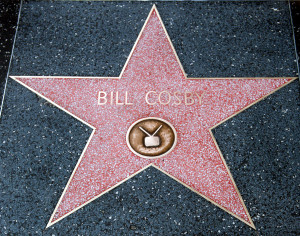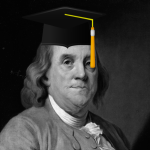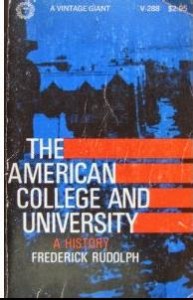 A few days ago the New York Times ran a story on the question of revoking honorary degrees. The focus of the story was the Bill Cosby, and questions about revoking his degrees in light of recent sexual abuse allegations. But the piece raises all kinds of interesting issues—to me anyway—about the meaning and significance of honorary degrees. I wouldn’t normally invest too much time thinking about such an arcane and, all things considered, relatively harmless symbolic practice. Except that sometimes those awards confer significance on some rather objectionable folks. And Americans have long valued the moral character of public figures over their intelligence (an ideal rebuked in two prominent essays by John Erskine and Lionel Trilling).
A few days ago the New York Times ran a story on the question of revoking honorary degrees. The focus of the story was the Bill Cosby, and questions about revoking his degrees in light of recent sexual abuse allegations. But the piece raises all kinds of interesting issues—to me anyway—about the meaning and significance of honorary degrees. I wouldn’t normally invest too much time thinking about such an arcane and, all things considered, relatively harmless symbolic practice. Except that sometimes those awards confer significance on some rather objectionable folks. And Americans have long valued the moral character of public figures over their intelligence (an ideal rebuked in two prominent essays by John Erskine and Lionel Trilling).
What do we know about the history of conferring honorary degrees?
According to a write-up prepared for the Brandeis University Board of Trustees (confirmed in other articles) the practice of bestowing these honors began over five centuries ago in the university setting—at one of the most prominent institutions in the history of higher education:
Honorary degrees appear to have arisen out of the practice of granting dispensations from certain particular academic requirements.
European universities began granting degrees “for the sake of the honor” (honoris causa) in the 15th century, and the first such degree was awarded at Oxford University in 1478 or 1479 to Lionel Woodville, Dean of Exeter, the brother-in-law of Edward IV and the future Bishop of Salisbury. These were essentially academic peerages, entitling the recipient to full privileges in the university, privileges that were much more extensive than now. At the same time universities conferred degrees on certain scholars whose career achievements warranted such recognition.
Given this, in what we now might call the “knowledge economy,” there were two reasons for bestowing the degree, one economic/scholarly (university privileges) and intellectual rank due to prior work done.
Despite the bestowal, apparently tradition also dictates that the recipient refrain from using the title of “doctor.” According to the same short Brandeis piece, only one American in history has flouted tradition: “An early and notable exception is Benjamin Franklin, who received an honorary doctorate from the University of St. Andrews in 1759 and the University of Oxford in 1762 for his scientific accomplishments, and thereafter referred to himself as “Doctor Franklin.”
According to the same short Brandeis piece, only one American in history has flouted tradition: “An early and notable exception is Benjamin Franklin, who received an honorary doctorate from the University of St. Andrews in 1759 and the University of Oxford in 1762 for his scientific accomplishments, and thereafter referred to himself as “Doctor Franklin.”
What the history of the honorary doctorate in the United States? According to the same article, “the first honorary degree awarded in America was an honorary doctor of divinity degree conferred by Harvard University in 1692 on its president, Increase Mather.”
My own histories of higher education (i.e. those on hand) neglect discussion of honorary doctorates until the 1870s and 1880s. In those decades the awarding of honorary doctorates increased precisely when the “real” doctorate—the PhD credential—was coming into its own in academia. In this jumbled period of doubt, when the path to the doctorate was not yet standardized, Frederick Rudolph reports that all manner of institutions, including Princeton and Dartmouth, awarded honorary doctorates in an effort to cover the tracks of faculty with lesser qualifications. When the path toward a PhD became more standardized, around the turn of the twentieth century, the number of honorary doctorates awarded declined precipitously, from 39 in 1890 to 2 in 1910.[1]Curiously, it was the rise of the legitimate PhD that inspired William James to write his now famous 1903 essay, “The Ph.D. Octopus.” In that piece, published in the Harvard Monthly, James decried the PhD as no guarantor of good teaching. He felt the credential was being used in a kind of faculty arms race being conducted at the time by prominent institutions, particularly Harvard University.  To James the advent of the real PhD signaled the rise of a new kind of academic elitism—a fig leaf covering a diminishment of academic freedom in favor of excessive organization of inquiry.[2]
To James the advent of the real PhD signaled the rise of a new kind of academic elitism—a fig leaf covering a diminishment of academic freedom in favor of excessive organization of inquiry.[2]
Returning to the present, the practice of giving honorary degrees has often involved celebrities. This recent lament from the London Telegraph notes the following honors given to those with dubious scholarly credentials:
– Kanye West, Honorary Doctorate, School of the Art Institute
– Jon Bon Jovi, Honorary Doctorate of Humanities, Monmouth University
– Kermit the Frog, Honorary Doctorate of Amphibious Letters, Southampton College, NY
– Dannii Minogue, Honorary Doctorate of Media, Southampton Solent University
– William Shatner, Honorary Doctorate of Letters, McGill University, Canada
– Yoko Ono, Honorary Doctorate of Laws Liverpool University
– Mike Tyson, Honorary Doctorate in Humane Letters, Central State University, Ohio
Returning to the NYT article, what of “honoris causa” that become “ignominia causa” (i.e. for the sake of dishonor)? Is the decision to revoke really that tough, with regard to Bill Cosby or other recipients whose choices degrade the award and the institution that bestowed it? Should our prominent institutions, such as Yale and Notre Dame (noted in the NYT article), be holdouts on rescinding honors? Not only does that seem like a bad intellectual decision, in that it diminishes the academic-intellectual reputation of the institution, but it would seem to be a poor industry decision as well. Nice message to your “consumers” and, more importantly, the parents of your marketing/recruitment/admissions teams. And what of the politics of reputation in an age where government purse strings have been pulled tight?
Lastly, there is, in the NYT article, a faulty that-was-then historicist line of reasoning given by an advancement officer: “We give out honorary degrees based on what we know at the time,” said Kimberly Alexander, vice president for institutional advancement at Talladega College in Alabama where Mr. Cosby was honored in 1992, “and at the time he was everybody’s favorite dad.”
And everyone’s favorite celebrity doktorvater, apparently: Few people in American history have been recognized by universities as often as Mr. Cosby, whose publicist once estimated that the entertainer had collected more than 100 honorary degrees. The New York Times, in a quick search, found nearly 60.
Returning to Ms. Alexander (providing her statement reflects the full context of the interview), since when did advancement officers become necessary protectors of institutional mistakes—or historical ignorance and past, mistaken moral judgments? If there was ever a breed of people lived in the present and future, it is advancement officers. It seems against their interests to maintain adverse historical judgments as sacred artifacts.
If “honoris causa” are embedded in the culture of higher education, then it seems that institutions must award them more carefully. No one can predict the future perfectly. But if past performance has any predictive weight, at all, in relation to future behavior, academic leaders ought to take past character of potential honorary degree receipients quite seriously. If administrators do not believe in the moral obligation to be intelligent, they might at least consider the obligation to be moral, or honorable. Award honorary doctorates to those least likely to dishonor both the institution and higher education generally. Make sure the genius in the portfolio before you has few-to-no character questions.
And if you do, unfortunately, give the nod to a person later revealed as possessing unsavory character traits, then protect your current and future integrity by rescinding the honor—for goodness sake. Renew the real significance and deep meaning of the award. – TL
———————————–
Notes
[1] Frederick Rudolph, The American College and University: A History (New York: Vintage, 1965), 396-7. Rudolph’s book was first published in 1962.
[2] Ibid., 397.


8 Thoughts on this Post
S-USIH Comment Policy
We ask that those who participate in the discussions generated in the Comments section do so with the same decorum as they would in any other academic setting or context. Since the USIH bloggers write under our real names, we would prefer that our commenters also identify themselves by their real name. As our primary goal is to stimulate and engage in fruitful and productive discussion, ad hominem attacks (personal or professional), unnecessary insults, and/or mean-spiritedness have no place in the USIH Blog’s Comments section. Therefore, we reserve the right to remove any comments that contain any of the above and/or are not intended to further the discussion of the topic of the post. We welcome suggestions for corrections to any of our posts. As the official blog of the Society of US Intellectual History, we hope to foster a diverse community of scholars and readers who engage with one another in discussions of US intellectual history, broadly understood.
Hmmm. Off the top of my head, I’d say that the medieval and ecclesial roots of the modern university — and those are still living, if sometimes awkward (and at other times quite lovely), structures that shape our institutional lives to this day — drew (and still draw) a little bit of sustenance from anti-Donatist orthodoxy. (It’s not a precise fit for this situation, but close enough.) I would guess that there’s a hesitancy at some institutions to approach even contemporary honorary degrees as revocable on the basis of subsequent developments for the same reasons that universities don’t view the “standard” PhD as revocable on the basis of subsequent developments. In cases where a PhD candidate has committed academic fraud or academic dishonesty in the course of completing the PhD, but that only comes to light after the PhD has been granted, the faculty would revoke the PhD — but that’s not due to a subsequent development, so much as to the discovery that the actual requirements of the degree were not in fact met by the recipient at the time the degree was awarded. I think you’re right to suggest that universities should maybe cool it with the honorary doctorates granted just as a perk/courtesy to commencement speakers. But I can understand the institutional judgment — or at least, I think, the roots of it — that takes a position that subsequent egregious moral behavior by an honorary degree recipient should not retroactively nullify a prior decision of the faculty to award the degree. I’m not crying any tears over universities deciding to de-honor Cosby — not crying any tears for Cosby, anyhow. But I don’t think that response is doing anything to protect the dignity and honor of those universities, so much as worrying about their “brand” and so simply affirming that much dignity and honor has already been lost. I actually think Yale’s approach is the better one here. In any case, perhaps the Cosby case will make universities and colleges more hesitant to hand out honorary doctorates like candy and party favors — and that would be all to the good.
And I guess I should have explained where I think anti-Donatism fits — sorry — haven’t had my coffee yet. Basically, just that the validity of the “sacraments” of academe derives from the institution, not from the individuals administering them. By analogy…a baptism administered in the church by people who were actually crypto-heretics at the time is still a valid sacrament. An ordination conferred by a bishop who subsequently bails on orthodoxy and joins a heretical sect is not invalidated because of the bishop’s subsequent actions. Like I said, not an exact fit for this case, but for some aspects of it.
Thanks for the comments, LD!
Looking at university/college “degree” conferral through the lens of the sacrament of holy orders is intriguing. Does that make office hours a kind of confession, lecture a homily, the old “scouts” a kind of low-class deacon, and the old college dinners a daily mass? I’m getting carried away, I know.
Whatever the history of a “degree,” it’s clear that the honorary degree has obtained less legitimacy over time, and is least attached to whatever criteria accumulated to the meaning of a degree. Also, what point is to be gained by current higher ed institutions, which have become secularized for a reason, in clinging to traditions that are specifically church-derived?
Nota bene: When I said in my post that I was referring to histories of higher education I had on hand, I was only referring to histories of American higher ed. – TL
Oh gosh. Even after now having had my coffee, I’m not sure I want to push — or defend — my invocation of anti-Donatism too far. But I think a modern secular equivalent of ex opere operato is a sort of institutional proceduralism, where the validity of academic credentials depends upon the integrity of the process (including the process of accreditation, by which degree-granting institutions are certified as qualified to grant degrees) not on the moral character of those particular individuals who represent the institution in any one case. Similarly, the degree-granting authority of the institution is not forfeited because someone who has met all requirements and has been properly awarded an academic degree subsequently commits heinous acts. That said, an honorary degree is different from an academic degree, with different qualifications/criteria. So I would absolutely agree that “the process” (such as it is these days) for conferring honorary degrees needs to be reconsidered.
This is a fascinating issue to me because my own alma mater has its own troubling problem with a past honorary degree. About ten years ago, as part of a study abroad relationship, we gave an honorary degree to a certain West African dictator. Although anyone paying attention knew at the time that that dictator was bad news, over time he has become more blatant and intemperate, announcing that all gay people in his country would be shot, declaring that he could cure AIDS with a healing touch, and “disappearing” dozens of political opponents. Visitors to his country through the study abroad program (recently suspended) report that the dictator proudly refers to himself as “Dr.” in his official propaganda and displays his honorary degree from my alma mater on all of his campaign literature — and he does have several other honorary degrees, but ours is the only one from an accredited American institution. So even though the university has now terminated our relationship with him, his continued holding of the honorary degree has real and troubling geopolitical significance.
My own feeling is that the practice of awarding honorary degrees should be separated from the practice of giving commencement addresses, although they are traditionally coupled. I think Bill Cosby got all those honorary degrees because people wanted him as their keynote speaker, but what if they’d just paid him a lot of money and given the degree to someone who deserved it, or at least to someone who had put in a lot of effort advocating for the university? That way nobody would feel bad about having invited Cosby to campus, and nobody would feel bad about the honorary degrees that are awarded.
Wow. Talk about a worst-case scenario. However uncomfortable academics are with explicit, public character judgments (i.e. they do them behind the scenes perpetually), some assessments cannot be avoided. And falling back on the historical-circumstances-were-otherwise reasoning is just a sorry excuse. – TL
Three things from my book of anecdotalia, each from the world of Catholic higher education: One, after WW II the Congregation for Seminaries and Education, a Roman dicastery of the Holy See, sent a letter to Cardinal Spellman of New York seeking his wisdom on a policy being developed to vet all prospective candidates for honorary degrees through the local bishop or his delegate. Spellman consulted with some Jesuits in higher ed, including the head of the Association of Jesuit Colleges and Universities. The Cardinal got a lengthy memo on the inadvisability of this policy, which was meant (in terms hardly veiled), to dis-associate a school from a would-be or avowed Communist. The main issue was academic freedom; universities would not care to have outside interference in determining who they may or may not honor. The matter was dropped in Rome. Two: some years ago I had a chat with Fr. Gustavo Gutierrez, OP, who is the well-known founder of liberation theology. Fr. Gutierrez had received a not so subtle vilification by those in the Vatican who disagreed with his ideas. Interestingly, he noted that he thought he would have had an easier time of it if he had accepted the invitations of several American institutions of higher learning to receive honorary degrees–including my own alma mater, Yale University. He had declined these honorifics as being “too bourgeois” though later on he recognized their cache. Three: I once taught at a Catholic university that offered an honorary degree to someone with whom I had serious disagreement. The issues turned on theological and political questions, but also the fact that the committee appointed to select the honoree had not consulted with the very department (my own; theology and religious studies) whose field he would represent. When I learned of this I sent letters to the committee and to the president of the university. When I did not hear from anyone, I wrote a campus-wide protest letter and sent copies to the administration telling them that I would not be attending the ceremony and laying out my reasoning for this act. “Good,” came the president’s reply. “I hope you don’t come,” he wrote, with a cc to the university’s corporate counsel.
All three are interesting anecdotes. On the first, no honorary degree, despite my call for some character screening, should ever be character screened by a bishop. Why? Some character screening is more scrupulous, pedantic, and political than others.
“Too bourgeois” is an interesting criteria for *declining* an honorary degree. I could imagine declining from a institution that I thought had supported some egregiously immoral activity (i.e. explicit and continued weapons research). But declining academic honors for class reasons? Most all of academia can be faulted for exacerbating some class problems. – TL